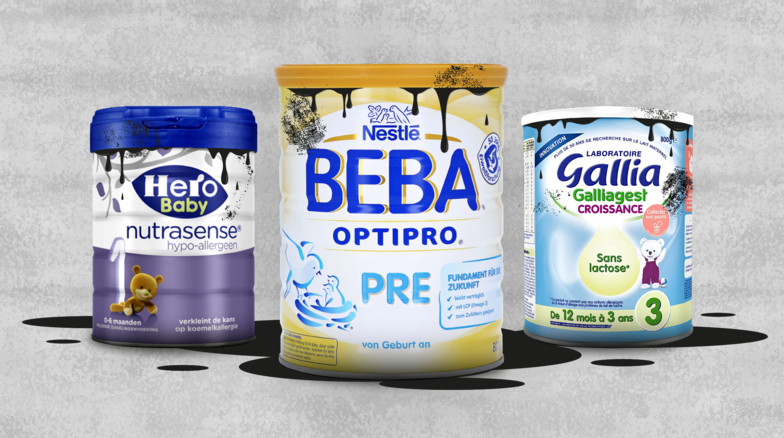Tests have found baby milk products contaminated with harmful mineral oil. foodwatch has tested infant milk on sale in France, the Netherlands and Germany in several laboratories. Products from Nestlé, Danone, Novalac, Neolac, Hero Baby and Nutrilon have been found to contain aromatic mineral oil components which are suspected of causing cancer. foodwatch calls on the companies to immediately withdraw the contaminated milk powder from the market and issue a warning to parents and carers. People can support this call by signing an email action in French or German.
Aromatic mineral oil components have no place in food - and certainly not in products for infants. Especially with food for newborn babies, parents and carers must be absolutely certain that the products are harmless to health.international campaign director of foodwatch
foodwatch had a total of 16 infant milk substitutes tested for mineral oil residues. For this purpose, the consumer organisation commissioned three renowned food laboratories to carry out different analysis methods independently of each other. In half of the baby milk products tested, residues of aromatic mineral oils (MOAH) were found. The milk products affected are:
In the Netherlands:
- Neolac Biooogisch 1 Volledige zuigenlingenvoeding 0-6 m; MOAH: 1.6 mg/kg
Batch number: 11620; Expiration date: 15.01.2021; - Hero Baby nutrasense hypo-allergeen 0-6 maanden; MOAH: 0.8 mg/kg
Batch number: 80926-023; Expiration date: 26.09.2020; - Nutrilon Dieetvoeding bij koemelkallergie 1 0-6 maanden; MOAH: 1.2 mg/kg
Batch number: 90722241; Expiration date: 22.08.2020;
In France:
- Nestlé Nidal Lait en poudre 1er âge; MOAH: 1.2 mg/kg
Batch number: 90720346AC; Expiration date: 01.03.2021; - Danone Gallia Galliagest Croissance 3 Sans lactose; MOAH: 0.7 mg/kg
Batch number: 905764 (019079); Expiration date: 19.12.2019;
In Germany:
- Nestlé BEBA OPTIPRO PRE 800 g von Geburt an; MOAH: 3.0 mg/kg
Batch number: 91120346AA; Expiration date: 10/2020; - Nestlé BEBA OPTIPRO 1 800 g von Geburt an; MOAH: 1.9 mg/kg
Batch number: A5952275; Expiration date: 11.03.2020; - Novalac Säuglingsmilchnahrung PRE 400g; MOAH: 0.5 mg/kg
Batch number: 9098080621; Expiration date: 10/2020;
Mineral oils could have been transferred from the metal cans
There are various sources of possible contamination with mineral oils in the entire production chain of baby milk products. The results show that the substances found are non-purified mineral oil components. They could have been transferred from the metal cans used as packaging for the products. So-called rolling and cutting oils are used in their production. foodwatch therefore advises parents to stop feeding their children infant milk from metal cans as a precaution until the manufacturers can prove that the products are not contaminated.
foodwatch purchased the tested batches at the end of July and beginning of August 2019. After an initial laboratory test had been carried out, foodwatch commissioned not only a repeated analysis in the same laboratory, but also two other laboratories to check the results. The results now available were analysed together with experts.
Aromatic mineral oils are potentially carcinogenic and mutagenic
Mineral oils are the biggest contaminant in the human body. "Aromatic mineral oils" are described by the European Food Safety Authority (EFSA) as potentially carcinogenic and mutagenic, which is why such residues should not be present in food even in the smallest amounts. Packaging is often the cause of mineral oil contamination. Packaging made from waste paper, for example, often contains mineral oils from printing inks that can be transferred to food. As early as 2015, foodwatch had 120 foods such as pasta, rice or cornflakes tested in an international laboratory test - 43 percent of the products contained aromatic mineral oils.
There are no legal limits
Although the health hazards from mineral oil impurities in food have been known for years, there are still no legal limits. foodwatch demands safe limits for mineral oils in food - for the particularly critical aromatic mineral oils (MOAH) a zero tolerance policy must apply.
Following the first tests from foodwatch four years ago, several major retailers committed – on a voluntary basis - to ensure that there is no more MOAH detectable in their food products, including LIDL and Aldi in Germany and five in France (E.Leclerc, Carrefour, Intermarché , System U, Casino). foodwatch calls for immediate regulation at the European level to prevent such contamination. There is no room for uncertainty. It is a matter of public health.
